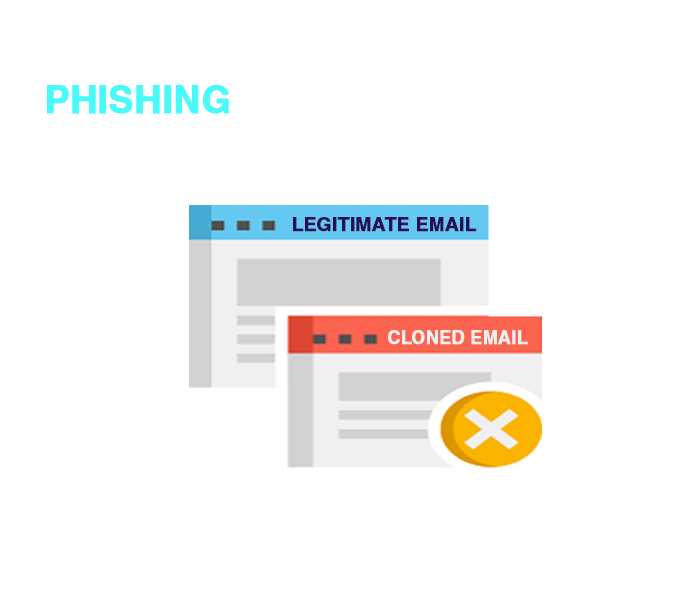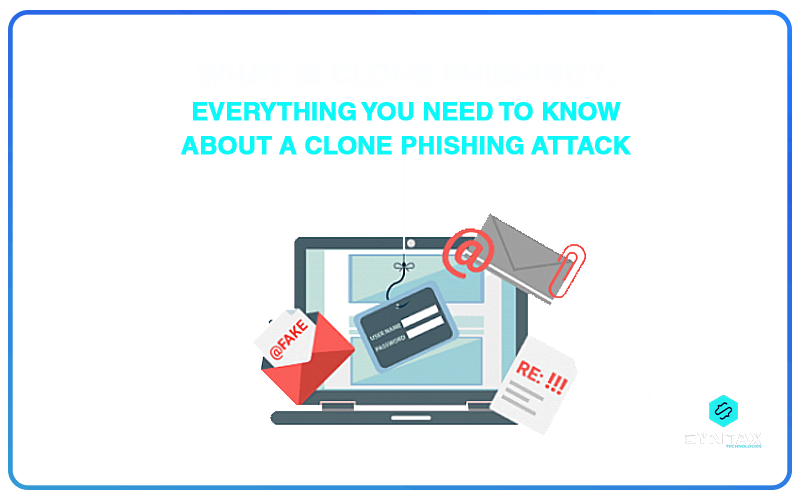What is every Hacker’s weekend getaway? They go Phishing – Punny Leone
The frequency and intensity of interaction of people across online platforms has increased by leaps and bounds.
The other party in this process of interaction is often institutions and individuals, with whom we may not have interacted on a physical basis.
This implies that this virtual interaction is based on mutual trust by which we are able to assume that the other party shall secure our interest.
However, what happens if that trust is unduly taken advantage of by a cyber criminal? The result can seriously hamper our interest and might even dupe us into downloading malware, revealing sensitive data and so on. This forms the crux of the answer to the question of what is Clone Phishing in Cyber Security.
In this blog, we shall try to look at what is Clone Phishing. In addition to the Clone Phishing definition, we shall look at the features and types of Clone Phishing Attacks.
Subsequently, we shall make sense of Clone Phishing Examples, ways to detect a Clone Phishing Attack as well as what does Clone Phishing mean in terms of its prevention strategies.
What is Clone Phishing in Cyber Security?
In this section, we shall look at what is Clone Phishing, Clone Phishing Attack as a prominent Cyber Security Attack.
As the name suggests, Clone Phishing involves the act of cloning or replicating. The attacker replicates/clones a legitimate email message, verbatim, from a trusted organization or business.
The hacker intercepts a genuine email and simply alters it by adding or replacing a malicious link which redirects the user to a fake or malicious website.
The email copy might even contain malicious attachment which might result in direct download of malware.

Clone Phishing is executed via a spoofed email sent from a location outside an organization. Cyber criminals exploit the tactics of display name spoofing for adding the touch of legitimacy to a cloned email.
The cloned email is directed to a large number of targeted individuals and the attackers keep a close eye on those who happen to click the links embedded.
When any individual falls prey to the attack, the hacker is able to acquire access to the contacts from the victim’s inbox and forward the same forged email to all those individuals too. The frequency of these clone phishing attempts is alarmingly high, making it more imperative for individuals and organizations to be vigilant.
Clone Phishing Definition: Its Features
In this section, we shall look at what does Clone Phishing mean in terms of its fundamental features.
- The attacker creates a duplicate/cloned copy of a legitimate email
- The spoofed email address will seem to have emanated from a legitimate source
- The replicated email contains malware downloads or links which redirects user to malicious websites
- The spoofed email is deliberately made to appear as a revert of the original email or an updated version of the original email
Types of a Clone Phishing Attack
- The email contains malicious links or attachments.
- The clone phishing email is sent from a spoofed address, wherein the objective or intent is deception. The purpose is to dupe the user into thinking that the email is from a legitimate source.
- The email takes the form of a re-sent email and is slightly tweaked to show that it has been updated.
Clone Phishing Example
The very fact that Clone Phishing involves the replication of a genuine email from a trusted source, it becomes all the more difficult to be identified.
In this section, we shall look at some of the common Clone Phishing Examples which will give us an idea of the type of instances which often accompany a Clone Phishing Attack.
- Messages which convey a sense of urgency in asking recipients to download a particular attachment or click on a specific link.
- Clone phishing emails with subject lines which speak of a time limit. For instance: Hurry! Your Discount Coupon is about to Expire; Click HERE to claim your credit.
- An email sending invites to collect coupons, discount codes, rewards or promotions.
- Hoax virus warnings.
- Emails which claim to represent a legitimate sender.
What does Clone Phishing mean: Signs of this Attack
Having gained some idea of what is Clone Phishing in Cyber Security, you must be aware of some of the loose signs which might indicate that you are being a victim of a Clone Phishing Attack. Let us have a look at some of them.
- Look out for grammatical or spelling errors in the cloned email.
- In trying a replicate an email from a legitimate trusted source, the attacker tries to use the same address; however, there is always a slight modification in the form of a missing letter or misspelled word. Look out for these signs.
- You should make sure that the hyperlinked text should match with the actual URL.
- You should be careful of impersonated email domains which do not match with the actual name of the company.
What is Clone Phishing Prevention Strategies?
In this section, we shall look at some of the ways by which you could prevent clone phishing attacks.
- Always cross-check or double-check the name of the sender as well as the email address in order to confirm that it matches with the original.
- Turn a blind eye to emails which promise highly unrealistic and lucrative rewards or offer propositions which feel too good to be true.
- Institute anti-spam software so that it will be able to filter out emails which appear to be suspicious.
- If you have reasons to feel that an email is false, do cross-check by following up with the organization who has sent the mail.
- Refrain from sharing your email and contact information with everyone.
- Scan attachments for malicious codes and viruses.
- Thoroughly screen every email that you receive before downloading any attachment or clicking on any link.
- Cyber Security awareness for all users of an organization is a must.
- Rely on websites which have https as the URL prefix.
- If you happen to be doubtful of a particular email, it is advisable to not click on the Reply or the Remove button.
- If you have already been a target of Clone Phishing, do report the same to an anti-phishing regulatory authority or Cyber Security cell.
Conclusion
By the end of this blog, I am pretty sure you must have developed a fair idea of what is Clone Phishing.
To better understand it, it’s important to differentiate between Clone Phishing and other types of phishing. In terms of Clone Phishing vs Spear Phishing, for example, Spear Phishing is more targeted, often aimed at specific individuals, whereas Clone Phishing is usually sent to a broader audience. The specificity and research involved in Spear Phishing often make it a more dangerous form of attack, but Clone Phishing can still pose significant risks due to the familiarity of the email being cloned.
The Clone Phishing definition would clearly suggest that by way of abusing the trust between an innocent individual and a legitimate authority; cyber criminals are able to achieve their malicious objectives and goals. Clone Phishing Examples also hint at the difficulty in identifying these kinds of attacks.
However, it is important to be self-aware by not only being aware of what is Clone Phishing in Cyber Security, but also through being vigilant and cautious while interacting with sources across a virtual platform. Awareness about clone phishing scams is essential in today’s digital world.
As a Cyber Security expert, it is imperative to be aware of the intricacies of each and every type of cyber attack and threat.
Phishing happens to be one of the predominant forms of Cyber attacks, which again can be of different types. Clone Phishing has evolved as a crucial type of the same.
We, at Syntax Technologies, provide you with the exceptional opportunity of developing comprehensive knowledge within the field of Cyber Security. Enrol now for our Cyber Security course.



